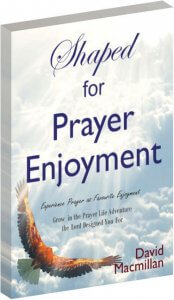Asking and answers are part of the prayer life norm. Use of our ask-license honours the Father, and he enjoys answering. Sometimes, however, the prayer mystery includes ’no answer’. The celebration of a dozen answers can be forgotten in the disappointment of one major non-answer. Unless our TRUST is anchored.
We ask with an outcome in mind. When God says no, or the answer is delayed or different, the upset of the ‘undesired outcome’ can shake prayer confidence and unplug the will to grow as a pray-er. Unless our TRUST is anchored.
The Father doesn’t always explain his reason for the ‘undesired outcome’. His silence doesn’t mean he has no good reason or is uncaring, but he wants us to trust him as much in the silence as when he thunders his love for us. And we can, when our TRUST is anchored.
TRUST is anchored in the glory of God: that is, his revelation of who he is and what he is like (his nature). His love for us is no secret and, because of it, he announces he will never stop being good to us Jer 32:40-41.TRUST is our rest-response to what he says of himself.
A “messenger of Satan, to torment me”; that’s what Paul called his “thorn”. Asking the Lord to remove it seemed like a good prayer point. He did it three times, and God’s answer was no. Undesired outcome? Yes. Disappointment? Probably. But the apostle’s TRUST was anchored in the nature of God; the restful confidence that the Lord will lovingly, wisely manage outcomes for our good. It allowed Paul to do more than accept the different outcome; he celebrated it. God’s answer (the ‘undesired outcome’) became a “delight” because in it he found a new level of Christ’s grace and power 2 Cor 12:7-10.
Prayer is at the heart of our enjoyment of Christ and his mission. So our opportunistic Enemy will try to hijack the emotional upsets of unanswered prayer (or ‘undesired outcomes’) to confuse, weaken and derail prayer life. He won’t succeed as long as TRUST is anchored.
TRUST deepens with nurture and weakens with neglect, so it’s vital that we keep strengthening our agreement with the Lord’s glory. Zeph 3:17 gives us half a dozen truths about the Lord who delights in us. Try the following:
- List the truths, then focus on one each day for the next week. Speak or sing your agreement with what he says about himself.
- Tell him why each of those aspects of his glory deepens your trust in him.
- Mention a current prayer disappointment. In anchored trust, pray a simple prayer relinquishing ownership of the outcome (answers belong to the Lord), choose to rest in his goodness toward you, and thank him that his answer (or the time waiting for it) will add to, not diminish, your enjoyment of him.
Note:
- There are times when answers from God are strongly opposed (e.g. Daniel 10) and when tenacity in asking is crucial.
- If you haven’t yet seen the post leading into this one, read Dealing with disappointment of unanswered prayers.




